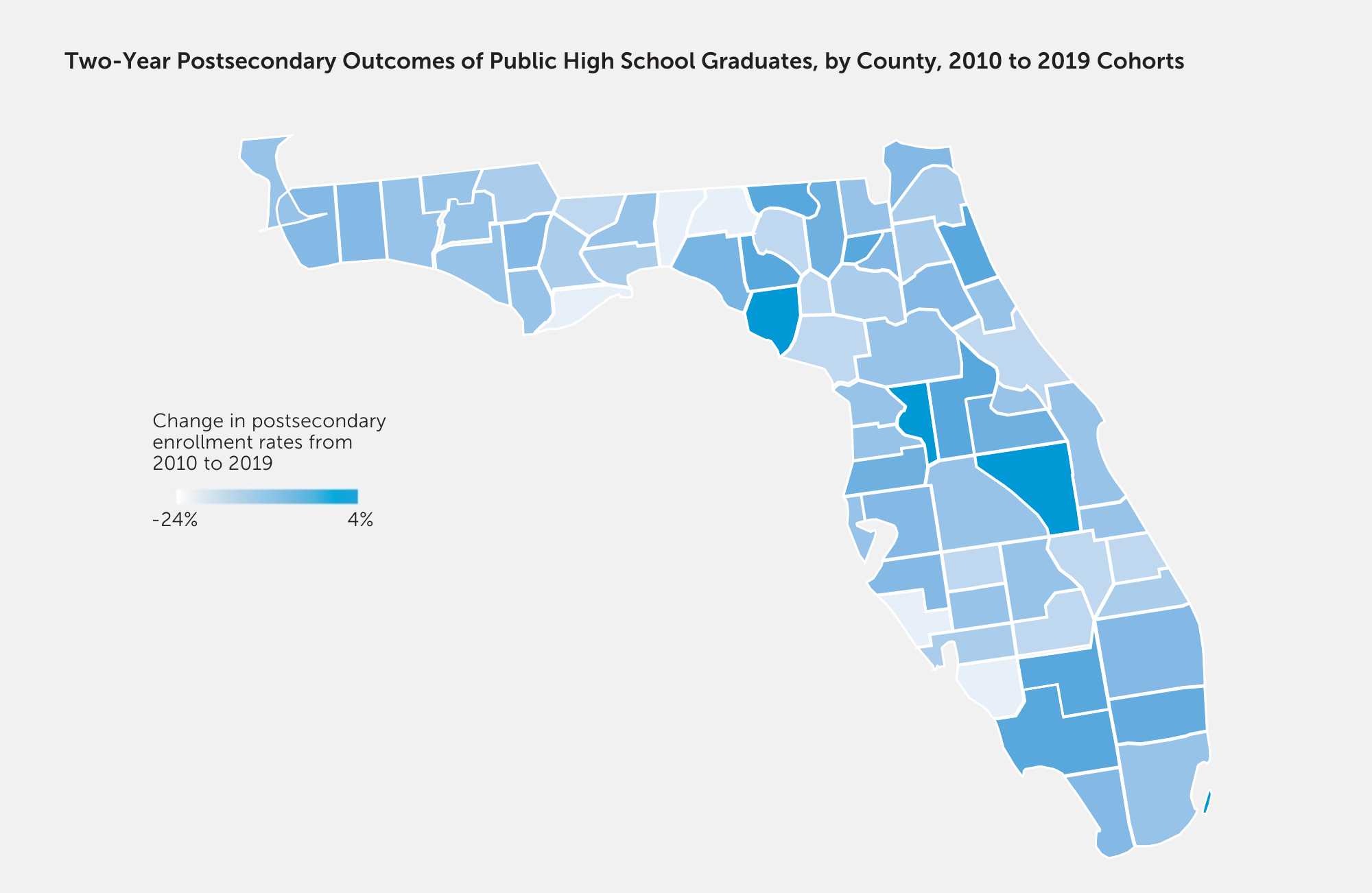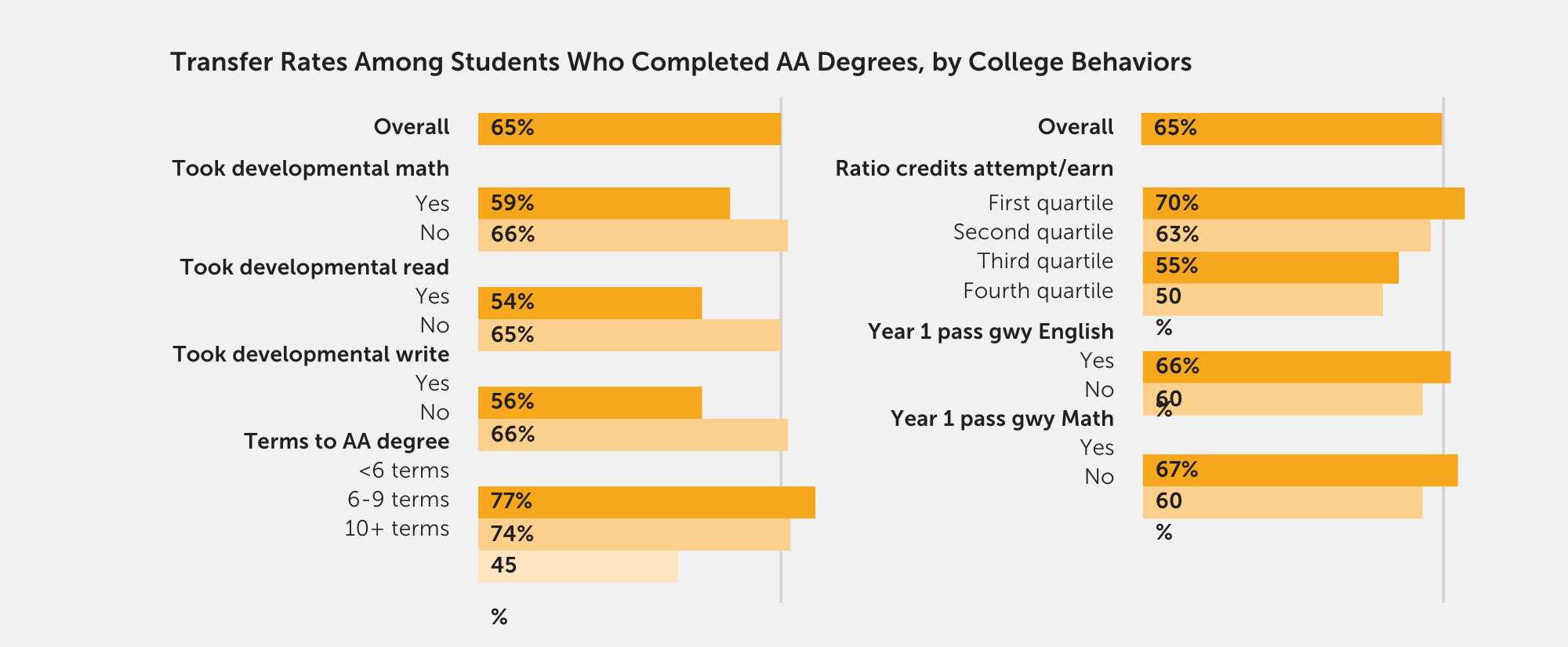Decreasing enrollment rates defied by steady college transfer rates in Florida
New report highlights latest trends and maps student transfer success
TAMPA, Fla. – A new report shows that while Florida college enrollment rates are down, those who earn Associate of Arts (AA) degrees are transferring to four-year universities at consistently strong rates.
Conducted by Helios Education Foundation and the Center for Postsecondary Success at Florida State University, the study shows high school graduate enrollment rates at Florida’s public state colleges have declined from 38% in 2010 to 30% in 2019 as more high school graduates opt to enter the workforce. Despite this enrollment decrease, transfer rates among students who have completed AA degrees have held impressively steady at 65% over this same period.
“This consistency in college transfer rates amidst falling enrollments highlights the persistence of Florida’s transfer students and the effectiveness of the state’s policies facilitating student transfers,” said Paul J. Luna, President and CEO of Helios Education Foundation.
Luna went on to express concern over the steady decline in enrollment rates across Florida’s public state colleges. “Florida’s state colleges offer a critical path to postsecondary degree attainment and play a pivotal role in ensuring equitable access to higher education. They are fundamental in leveling the educational playing field and empowering all students to achieve their academic and career goals.”
The report also reveals new and important insights into college behaviors and the nuanced pathways to student transfer success.
Underscoring the significant role college behaviors play in influencing student success, the data show that when students complete their AA degree within two to three years (six terms), they are 77% more likely to transfer into a four-year institution to pursue their bachelor’s degree. In comparison, students who take five or more years (10 or more terms) to complete their AA degree are only 45% likely to transfer. Additional indicators of transfer student success include whether a student took accelerated coursework in high school, such as dual enrollment or Advanced Placement courses; if a student took on a full-time course load; and if a student passed first year introductory or gateway math and English courses.
“This report shows how specific academic behaviors significantly influence the likelihood of a student transferring from a two-year institution to a four-year institution, painting a clear picture of what success looks like,” said Paul Perrault, Senior Vice President of Community Impact and Learning at Helios Education Foundation. “The findings reveal a path forward to further boost college transfer success in the state through expanded access to accelerated coursework and incentivizing academic sequencing that encourages continuous college enrollment.”
Additional highlights from the report include:
Changes in Florida state college enrollment rates by county
Overall, high school graduate enrollment in Florida’s public state college declined eight percentage points, with some counties experiencing gains of up to four percentage points and others with losses of more than 20 percentage points. Notably, three counties—Dixie, Sumter, and Osceola—have bucked the trend, each registering a three to four percentage point increase in postsecondary enrollment rates. Levy, Gadsden, and Glades counties had the greatest postsecondary declines in enrollment rates at 20 percentage points or more.
Variations in Florida’s Transfer Rates by College Behavior
The study further reveals that college behaviors like academic sequencing plays a critical role in student success and transfer rates. Students who completed gateway math or English courses within their first year demonstrated a significantly higher likelihood of transferring compared to their peers enrolled in developmental education courses.
Read the full Associate of Arts Transfer Pathways in Florida research study, along with recommendations to further bolster transfer rates.
The Center for Postsecondary Success at Florida State University
The mission of the Center for Postsecondary Success (CPS) is to provide support for and foster collaboration among those who are interested in conducting research on student success in postsecondary education and to identify and evaluate institutional, state, and federal policies and programs that may serve to improve student success.



